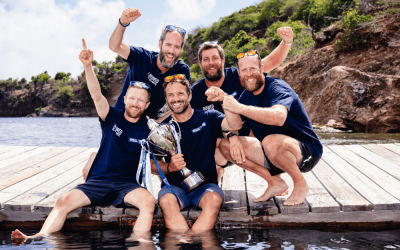Ship & Boat International: Editorial comment

The speed of the spread of the COVID-19 pandemic has made it extremely difficult to assess its impact on the marine sector; the situation is currently accelerating at such a rate that even rolling news reporters are struggling to keep up. At the same time, it seems remiss to ignore what’s shaping up to be a serious challenge for ship operators, boatbuilders and OEMs alike.
Obviously, the most important factor is to protect as many lives as possible, and Ship & Boat International sincerely hopes that everyone out there is managing to stay safe. We also appreciate that that’s easier said than done. From vessel naming ceremonies and IMO meetings, to PSC inspections and arranging crew travel, ours isn’t an industry particularly suited to ‘social distancing’. While those on the frontline of healthcare and emergency services thoroughly deserve the praise they’ve received this past week, we should also remember the thousands of fishermen, coastguard personnel, seafarers and stevedores we depend on for food, medicine, security, fuel and vital equipment.
Given the frantic pace of the situation, let’s keep it simple: it’s going to be a bumpy ride. The offshore sector was one of the first to immediately suffer in the past fortnight, as crude oil prices dipped to US$20-30 per barrel, compounding the misery of the downturn that plagued the sector in the late 2010s. One commentator even joked – albeit while struggling to smile – that the oil companies might start paying customers to take barrels away, to save on storage costs.
Besides the economic fallout, the threat posed by COVID-19 throws up safety concerns for offshore personnel, especially those cooped up on SOVs, platforms, jack-ups and accommodation units. An outbreak aboard a significantly sized floatel, perhaps housing 400 single cabins, would rip through its onboard complement in no time; hand sanitiser and recommendations on safe distancing wouldn’t even begin to address the risk. Shipbuilding and repair yards could also be vulnerable to such outbreaks, potentially leading to increased workforce stress, reduced levels of manpower, delayed deliveries and cancelled orders.
The ferry sector is similarly facing a nightmare. Numerous European ferry operators, including Stena Line, DFDS and Brittany Ferries, have been forced to slash domestic and international services over the past fortnight, thanks to plummeting ticket sales. A joint statement issued on 23 March by the UK Chamber of Shipping and seafarer unions Nautilus International and the RMT warns: “The collapse in passenger demand is expected to last for the foreseeable future as countries attempt to ride out the COVID-19 storm…we believe that government has a central role to play in backing our seafarers and business throughout this profoundly difficult time.”
While this is clearly hurting operators everywhere, it’s especially heart-breaking – and worrying – when considering ferry services in developing nations. Countries such as Bangladesh and the Philippines, for instance, have made tremendous efforts to better their domestic ferry safety records and reduce passenger fatalities. One fear is that bankruptcy could put responsible, conscientious ferry companies out of business, clearing the way for less scrupulous operators to offer cheaper but unsafe crossings, using older, poorly designed boats.
Similarly, it’s been encouraging to note those operators in developing countries who've tackled the problem of passenger overcrowding. However, these efforts have been based on preventing capsizal, not contagion. Many domestic ferries within these regions tend to be tightly packed with passengers during busy periods, and a passenger complement well within payload limits could still prove a sufficient conduit for rapid spread of the virus.
Add to this the fact that many commuters in Asia, especially those located in archipelagos, heavily depend on waterborne travel, and we could be sitting on a time bomb if the situation isn’t managed appropriately. The southern hemisphere’s winter months are drawing closer, and with them a potential upsurge in infection rates across the Asia-Pacific, Latin America and Africa, thus lending an extra sense of urgency to an already tense situation.
Now may be the ideal time to take the lead from the supermarkets and tech companies and opt for a strategy of collaboration to get through this; as the maxim goes, “we’re all in this together”, and we’re certainly up against a formidable foe. Perhaps we will see autonomous and remote-control technology come to the fore; not to replace seafarers and their vital skills, but as a possible means of reducing social contact in select situations. ROVs and AUVs have already demonstrated their value in undertaking ‘dull, dangerous and dirty’ tasks in the naval and offshore/subsea sectors, taking humans out of the danger zone, and these solutions might be incorporated into missions where personnel would otherwise be exposed to risk of infection.
The marine sector could also make a greater noise about its importance: whether that translates to more assertiveness when pursuing government assistance, or a greater willingness to speak out about the vital roles played by fisheries, sea rescue services, ferries and ports (to name but a few) in keeping nations secure, connected, supplied and fed. For far too long, we’ve been one of the lesser-publicised links in the logistics chain; it would be good to make it clear to the press and the general public that, if the marine sector goes down, others will follow. Good luck, and stay safe.





